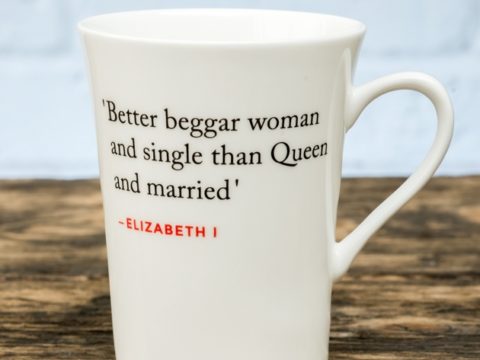James VI & I: Life Story
Chapter 21 : The Duke of Buckingham
With Somerset out of favour, George Villiers now shot to stardom, rising from the fourth son of a country gentleman to being the only non-royal duke in either kingdom by 1623 as Duke of Buckingham. There are more indications that James and Villiers had a sexual relationship than is evident for any other of James’ favourites, although the passionate language used by men and women to friends of the same sex in the 17th century render it possible that despite what appear to be love-letters, the relationship might not have been consummated. Buckingham himself, whatever he might have done with James, was happy to engage in heterosexual activity, and to marry allegedly the richest woman in the country, Lady Katherine Manners, daughter and heir of the Earl of Rutland. Queen Anne was also fond of Buckingham and was glad to see him supplant Somerset, whom she hated.
The closing seven years of James’ reign were controlled largely by Buckingham who worked closely with Sir Francis Bacon, who became Lord Chancellor in 1618. Between them, Buckingham and Bacon controlled a government that was becoming increasingly corrupt and divorced from James’ earlier pronouncements on a King’s duty to rule within the law (even though he was possessed of Divine Right).
James’ reign had been a byword for financial corruption, prodigious overspending and blatant sale of offices, by the Howard faction under Suffolk, Northampton, and, by his marriage to Suffolk’s daughter, Frances, Somerset. Various retrenchment schemes had come to nothing in the face of royal extravagance and ministerial greed. James had introduced new revenue raising schemes, based on new or increased customs duties, known as impositions. He also hoped to obtain some much needed cash through a dowry to be received for Prince Henry’s marriage, but the Prince’s death had stymied that plan.
By 1614, James had no choice but to call Parliament for ‘supply’ as taxes for government were (and, officially, still are) known, but the Privy Council was either not prepared, or was not able, to manage the Commons as Elizabeth had. James opened the session with the ambition that it become known as ‘the Parliament of Love’ as he hoped to smooth away strife. But to no avail: within weeks there was deadlock as the Commons requested the Lords to join them in seeking to have the new impositions removed. The Lords refused, scenting sedition. The Commons therefore declined to consider the matter of supply.
James dissolved the assembly, and, far from it being the Parliament of Love, it is remembered as the 'Addled Parliament'. But this still left him without money. Under Buckingham, although he took sweeteners for promotion to office, James was reasonably even-handed with whom he favoured, and made some strides towards getting the royal finances under control.
But this was not enough, and James continued to dream of a fat dowry for his son. Negotiations were opened with Spain, who promised an Infanta with £600,000. In return, Catholics were not only to be tolerated, but were to be allowed to worship in the Infanta’s own Chapel Royal. Whilst there was no possibility that the English public would stomach such an arrangement, of which James was perfectly well aware, he continued to play along.
Meanwhile, responding to anti-Spanish feeling at home, he freed Sir Walter Raleigh with a view to the great seaman undertaking a voyage to South America that would, hopefully, result in discovery of a goldmine – or at least, the discovery of Spanish ships carrying the precious metal. The Spanish ambassador was assured that Raleigh’s liberty was not an affront to his kingdom, and that if Raleigh interfered with a single Spaniard, he would pay for it with his life.
Unsurprisingly, the expedition fell foul of the Spanish, and Raleigh, on his eventual return was tried, convicted and executed. Even Queen Anne’s plea for mercy, delivered via Buckingham, was rejected. For James, peace with Spain was more important than any other consideration.
But peace was not easily had – the clouds of religious war were again gathering over Europe. James’ daughter, Elizabeth, had been married in 1613 to Frederick, the Elector Palatine. On the death of the Catholic Holy Emperor Matthias, who was also King of Bohemia, an elective crown, Matthias had sought to have the Bohemia crown passed to his cousin, Archduke Ferdinand. The Bohemians were divided, but a breakaway group offered the throne to Elector Frederick.
James was appalled – he knew that Frederick could not accept the Bohemian throne without bloodshed, but he prevaricated. He sought to mediate between the two sides, but did not firmly tell Frederick and Elizabeth that they would not have his support. In the inevitable defeat of Frederick, James refused to engage with troops – he would not embroil his subjects in a needless war. Once again, in seeking to please everyone, he pleased no-one. Eventually, a small private force was raised to help Frederick re-establish himself in the Palatine, but it failed. The Thirty Years’ War, the most destructive European conflict before the twentieth century was unleashed, killing between 5 and 11 million of the European population as Catholics and Protestants struggled for the continent’s soul.



